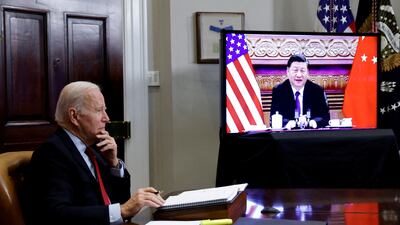US President Joe Biden will speak with Chinese leader Xi Jinping on Thursday amid tensions over Taiwan, people familiar with the matter told Bloomberg.
The first conversation between the two presidents since March will take place at a difficult time for US-China ties. House Speaker Nancy Pelosi’s staff are not ruling out plans for her to visit the self-governing island in August.
Chinese Foreign Ministry spokesman Zhao Lijian said on Monday that Beijing was “seriously prepared” for the possibility that Ms Pelosi could visit Taiwan, which Beijing considers to be part of “one China”.
Nicholas Burns, US ambassador to China, said in June that relations with China have deteriorated to probably “the lowest moment” since they resumed in 1972.
Mr Biden, who is recovering from the coronavirus, is considering whether to lift some tariffs on Chinese imports in an effort to cut inflation.
Officials said the call with Mr Xi would be a continuation of US efforts to maintain open lines of communication to ensure that the relationship does not veer into unintended conflict.
No final decision has been made about a stop in Taiwan during Ms Pelosi’s trip to Asia next month, a source said. Ms Pelosi would be the first sitting Speaker since Newt Gingrich to visit the island in March 1997.
Beijing promised “resolute and strong” measures in response and warned of a “grave impact” on bilateral relations should Ms Pelosi go ahead with the trip.
China privately told the Biden administration of a possible military response, the Financial Times reported.
“All the ensuing consequences shall be borne by the US side,” Mr Zhao said.
Wang Yang, a member of China's Politburo Standing Committee, said at a meeting on Tuesday that “no individual and no force should underestimate the resolve, the will and the ability of the Chinese people to defend their national sovereignty and territorial integrity.”
He also “stressed the importance of upholding the one China principle,” according to the official Xinhua News Agency.

In the US, politicians in Democratic and Republican parties encouraged Ms Pelosi to make the trip, saying not doing so following China’s protestations would amount to acquiescing to Beijing.
“If we can allow the Chinese to dictate who can visit Taiwan and who cannot, then we have already ceded Taiwan to the Chinese,” said Senate Foreign Relations chairman Bob Menendez, a New Jersey Democrat who went to Taiwan in April.
House Minority Leader Kevin McCarthy said on Tuesday that Ms Pelosi “shouldn’t back down now,” but that she “should make it a bipartisan trip”.
Mr Biden told reporters last week that the US military did not think Ms Pelosi’s trip was a good idea, prompting consternation in Taiwan.
It is not clear if Ms Pelosi, at the request of intelligence and defence officials, will decide against the trip.
The president provoked China in May with a promise to defend Taiwan militarily. After saying that US policy on Taiwan “had not changed at all” during a news conference in Tokyo, he then answered “yes” when asked if the US would act “militarily” to defend the island in the event of Chinese action.
White House officials said Mr Biden was only promising US aid to help Taiwan defend itself in the event of hostilities.
National Security Council spokesman John Kirby told reporters on Tuesday that the Biden-Xi session would include a robust agenda, although tariffs were not likely to be among the issues.
“I wouldn’t think it would be a major topic of discussion with President Xi unless or until he makes a decision,” Mr Kirby said.
The leaders will talk about tensions over Taiwan and ways to manage the competition between the two largest economies, he said.
The White House has threatened consequences for Beijing should China aid Russia in its war in Ukraine. US officials said they have not seen anything that would amount to material support.
US tariffs
Mr Biden’s aides said he is close to a decision on whether to scrap some of the tariffs president Donald Trump imposed on roughly $350 billion in Chinese imports.
Some advisers have pushed for the move to help ease inflation that is running at a four-decade high. Others, including trade unions, said it would have little impact on price pressures and weaken the US's hand in talks with Beijing.
Mr Biden has repeatedly pledged to be the most pro-union president in US history, and Democrats are counting on labour support in November midterm elections that will determine whether the party retains control of Congress.
“The president is still thinking about it,” Commerce Secretary Gina Raimondo said on CBS’s Face the Nation on Sunday. “You know, this is a big decision.”
Mr Xi sent Mr Biden a note last week wishing him a speedy recovery from the coronavirus.
The Chinese Communist Party is scheduled to hold a national gathering in the autumn that ss expected to vote on a third term for Mr Xi.

